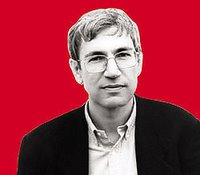The Trial of Orhan Pamuk

Today is a sad day for free speech and for novelists. In 1987 the New York Times wrote "a new star has risen in the east..." in reference to Turkish novelist Orhan Pamuk. Today he stands trial for violating Turkey's laws forbidding the insulting of "Turkish Identity," for bringing up the issue of the Armenian Holocaust during an interview with a Swiss reporter. His remarks were far from inflammatory by Western standards. What he said was "a million Armenians and 30,000 Kurds were killed in these lands, but few dare to talk about it." Indeed, for talking about it Pamuk faces up to three years in prison, and he is not alone but only one of 60 writers and publishers facing punishment for violating the new law in Turkey.
The author of acclaimed novels Snow and My Name Is Red, Pamuk has been mentioned as a candidate for the nobel prize. His most recent novel Snow meditates upon the nature of theatre, art, government and oppression, and the strange places where these elements synthesize. It begins with a successful and controversial play in which a Muslim member of the audience is brought onstage and tortured. The plot spirals into a situation where an actor is brought into power by coup, and the lines between the reality of theatre and the theatre of political life is increasingly tenuous. During this shift, an exiled poet, Ka, returns to Turkey, the scene of the novel, to investigate a string of suicides in remote Kars. Ka is cut off in Kars by snow during the coup which ascedes the actor to power, and what dramatic changes happen to Ka during that period are pieced together in present-day by the character Orhan Pamuk. It is a beautiful and melancholy work that looks deeply not only into political identity, but also into the ability to find sublimity in dismal and isolated times.
It is difficult to hear news that not only is free speach so imperiled in a country on the verge of EU membership, but that an event such as the Armenian Holocaust is still controversial. Between 1915-1917 hundreds of thousands, and by some counts over a million, Armenians were systematically executed. The execution began with thousands of the leading Armenian intellectuals being executed overnight by government soldiers, and was followed by the robbing, raping and killing of the majority of the Armenian population. The government formed either twenty five or twenty six concentration camps near the Iraq and Syrian borders, where populations were killed either by morphine injection, or by being herded into mass graves and buried alive. One military tribunal has suggested that gassing was also employed, and further semblance to the Jewish Holocaust is evoked in seeing pictures of the grossly starved population of men, women and children in camps during that time. In the end, nearly half the Armenian people were murdered in a two year span. The Turkish state has declared that rather than any planned genocide, the high number of deaths of Armenians during this period is attributable to inner-fighting in the state. When Iranian president Mahmoud Ahmadinejad referred to the Jewish Holocaust as a myth he was roundly and rightly criticized by European heads of state. In Turkey the official line is equally offensive to the history of a people, but the international reaction has been far quieter about the Turkish government's reprehensible, revisionist views. The presses in Turkey, even the progresive presses, have been nearly silent on the issue, and it is possible that Pamuk, and the 60 other intellectuals on trial for similar offences will go to prison for their stance the issue. Nations, including the United States should be outraged, not only at Turkey's law banning free speech, but on their views on the Armenian Holocaust as well. If we are a state that values free-speech and truthful accounting of history, we could at least speak out against this sad proceedings.
Thankfully, there may be some respite for Pamuk. Since Turkey is vying to be allowed into the European Union, several ministers of the union have spoken out against the arrests of Pamuk and other charged critics. One minister called the arrests "regrettable," and another, "unacceptable." Turkish officials, or most of them, are interested in joining the EU and are aware that this tarnishes a reputation already tarnished. Turkey has long been thought of as being a conservative, military state whose record on human rights abuses is deplorable. Many in Turkey do no wish to become members of the EU, and prefer a more conservative, isolated state. They are collectively known as the "Deep State" (Deep South, anyone?), and see Pamuk's trial as an oppurtunity to stall EU membership and reinforce nationalistic values. The EU's speaking out, however timorously, against the free-speech trials may be having effect. On this, the first day in Pamuk's trial, the Judge halted proceedings to ask for the Ministry's position on the matter, since Pamuk's remarks were made before the laws making it illegal to denigrate Turkey's image were passed. This is a stalling tactic, and not a legitamate response to the EU minister's requests that the trials be halted for good. Pamuk still may be tried, and the trials of the other 60 are going ahead as planned. The Turkish government goes on insisting that it did not commit genocide in the twentieth century. As Pamuk left from the courthouse today, the BBC reports he was hit by a woman with a folder, jeered at and insulted by crowds gathered outside the courthouse. Even as he pulled away in his car, an egg splashed against his window.



0 Comments:
Post a Comment
<< Home